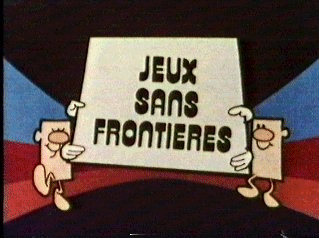Games Without Borders
In 1965, General Charles de Gaulle proposed the existence of a kind of games that would reinforce the recently renewed ties between France and Germany. Inspired by the summer competitions between French cities (some of which took place inside swimming pools), Games without Borders (JSF) – the longest transmission in the history of television co-productions – soon involved more European countries. This helped to build a Europe that even today tries somnambulistically1, through a complex mechanism that oscillates between vassalage and mirroring, to constitute a strong block able to counterbalance the USA, while cementing old internal chauvinistic beliefs.
The element of spectacle that was after all the leitmotif of these games, whose bulk of viewers - this newly imagined European community2 - watched them on TV, was even reflected in their organization, with a host and a film crew from each participating country. Eládio Clímaco, Ana Zanati or Fialho Gouveia were for the Portuguese audience what Ettore Andenna and Marie-Ange Nardi were for the Italian or the French, as can be seen in many websites of nostalgic JSF fans.

Thus the game and its playful nature was combined with a dilution of the internal borders of a Europe that wanted to be competitive and united at the same time.
The Games Without Borders – with their matches occurring in unknown countryside towns which looked like a caricature of a world from which it was imperative to flee; with their desperate swimming pool races wherein productivity was rated by the number of sponge balls caught; with our improvised couch brotherhood towards those beings in wet t-shirts trying at all costs to make the show go on (and thus Europe) – are the perfect metaphor for the inner void that we exhibit as Europeans.
Games without Borders that are only possible insofar as another game (and many other counter current games, we want to think) doesn’t have borders as well. Money circulates; wishes are exported via satellite, cable or the Internet; products are manufactured or arrive by land or by air, altering landscapes, customs, and behaviours; territories (where people are prevented from entering) are quickly crossed by electromagnetic waves, gas and oil pipelines, in a movement from South to North that corresponds to the route of raw materials, a path opposite to that on which people circulate. The geographic space is non-linear and non-logical, made out of connections and networks infinitely more complex than the lines of the Nation-State.
Reflecting upon the multiplicity, the inter-connections, the non-linearity and the illogical nature of these paths of people, things, and customs (in which our own lives can be included) is the raison d’être of the book “Jogos Sem Fronteiras” (“Games Without Borders”). Here, in its more or less great internal coherence, borders are understood in a broad sense – as a metonymy of the “transformation of the space produced by people displacement”, which Ursula Biemann talks about3.
We distance ourselves both from a fragmentary vision which treats certain issues as if they were unrelated (looking, on the contrary, at “immigration”, “work”, “repression” or “technology” as deeply interconnected subjects), and from a humanitarian perspective which addresses immigration as a problem that needs to be solved in a more or less fair way.
The border is understood here not as a groove, but as a program “whose operation invests and covers the whole set of social relations”4; as a police force specialized in separating who is from who is not; as an operation permanently being reiterated in space, academic disciplines, knowledge, and in our own acts; as a line that crosses us all, and which it is important to talk about.
Therefore, this set of articles and images comes out of our effort-pleasure in raising these issues, about which we feel the urgent lack of a critical discourse carried on with all the tools (of writing, social sciences, literature, cinema, theater, photography). It represents a kind of movement to give voice (to me, you, the expert, the immigrant that is you now, but that was me yesterday and vice versa), to write stories which may oppose the massification of media that turns everything into a single story.
revision by Alice Giroto and Isabel Brison
- 1. As Eduardo Lourenço says in O labirinto da saudade (LOURENÇO, 2000).
- 2. To use Benedict Andersen’s well known expression (ANDERSEN, 1983).
- 3. As Ursulla Bieman says in http://www.buala.org/pt/a-ler/escrever-uma-contra-geografia.
- 4. Ricardo Noronha in http://www.buala.org/en/to-read/we-are-all-illegal, first published in Jogos Sem Fronteiras, edições Antipáticas, 2008.